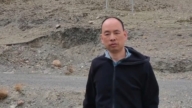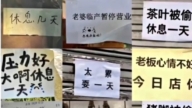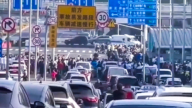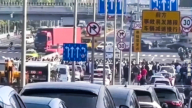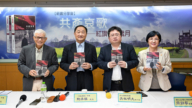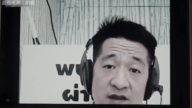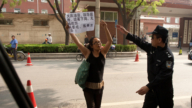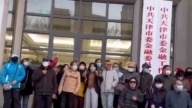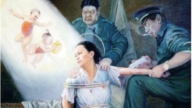【新唐人2014年02月17日讯】长久以来,中国大陆的户口制度一直为外界所诟病,国内要求取消户籍制度的呼声也是不断,但当局在大力推进城市化的同时,却不愿取缔户口制度,导致诸多社会问题。最近,四川省就爆出了一件女儿为给亲生父亲办理社保、而与父结婚的荒唐事。
据大陆媒体报导,30多岁的林丽(化名)家住四川成都成华区,离婚后独居。去年,老家的父亲生病,花费很大。因此,林丽希望能将父亲的户口迁到成都市,并为父亲办理社保,从而节省医药费。
但林丽的房子不到70平方米,不满足当局规定的老人投靠子女入户的条件。无奈之下,林丽决定和自己的亲生父亲结婚,从而让父亲拿到成都市的户口。
今年年初,父女俩在民政局成功办理了结婚证。但当林丽来到辖区派出所时被告知,这种情况不能为她的父亲办理成都户口。
林丽只好又回到民政局希望“离婚”,但工作人员说,协议离婚只适用于合法婚姻,林丽的情况只能去法院处理。于是林丽又将父亲告上法院,解除婚姻关系。
对此,自由撰稿人、原《河北人民广播电台》编辑朱欣欣表示,中国的户籍制度是政府通过所谓的法律手段,人为的把老百姓分成几大类,制造了在社会保障等许多方面都极其不平等的城乡二元结构。
自由撰稿人、原《河北人民广播电台》编辑朱欣欣:“人们为了突破这个限制,不得不采取所谓非法的手段、对策,来维护自己合法的、应有的权利。这是一个荒唐的事情。”
独立评论员邢天行也谈到,亲生父女结婚本身就是一个大笑话,是一件耻辱的事情。这也从一个侧面反映出,在中共体制之下,当今中国社会的道德已经几乎没有底线,人们为了达到自己的目地,无所不用其极。
邢天行分析,这背后有两个因素,一个是:从医疗保险等待遇上看,大城市和小城市、城乡之间的差距比较大,当局并没有对民众给以平等的对待和关注。另一方面,中共多年来,一味鼓吹“向钱看”,把人们推到了今天这一步。
独立评论员邢天行:“在道德的建树上,它(中共)跟中国的传统是割裂的。所以就是这种耻辱感、好多东西都没有了,就是一个钱、一个利益。只要我能占便宜,只要我能省钱,那就是说这个人聪明。这么多年,中国社会就到了这种地步了。”
这一父女结婚事件被曝光后,大陆媒体纷纷援引《新京报》的署名文章指出,这一荒唐事件,其实是民众对生存状态发自心底的一种呼唤,是对户籍制度变革、城乡一元化等极端的诉求。
中共已经实行半个多世纪的户籍制度,将公民分为农业户口与非农业户口。这两大类民众在升学、就业、社会保障、医疗、居住等很多方面都被区别对待,这造成了严重的城乡差异和城乡二元结构。假结婚、假离婚等户籍荒唐剧也因此不断上演,令人目不暇接。
近年来,大陆当局大力推进城市化,城市规模不断扩大、城市数量也不断增多。但当局在户籍制度上却不愿做出大的变革,这严重限制了中国人的自由迁徙,无数在外打工的人成了在自己国家的“暂住”者。
同时,户籍制度的存在,也使中国的城市化进程,变得有名无实。大陆官媒最近就自称,虽然统计数字显示大陆城镇化率已超过50%,然而完全享受市民待遇人口的实际城镇化率仅为40%左右,还有2亿多农民处在“半城市化”状态。他们虽然进了城,却没有成为城市市民,不能享受城市居民的教育、医疗、卫生、社会保障和住房保障。
采访/陈汉 编辑/李谦 后制/萧宇
Woman Marries Father for Better Medical Care: Another Hukou Tragedy
Over years, Mainland China’s hukou system
(household registration) has faced heavy criticism.
Chinese people have continuously
called for an end to this system.
However, the Chinese Communist Party (CCP)
authorities appears to be reluctant to do this.
This is despite its strong push for urbanization,
and has resulted in numerous social problems.
Recently, the story of a young woman marrying
her father in Sichuan Province was reported.
She did so to gain access to better medical care for him.
Chinese media reported the story of Lin Li, a given name,
a resident of Chenghua District, Chengdu, Sichuan Province.
Lin lived by herself after she had been divorced.
Last year, her father became ill and needed
a lot of money for medical treatment.
To reduce his costs, Lin Li therefore hoped to
move her father’s home registration to Chengdu.
This was so that he could be covered
by Chengdu’s medical care system.
However, the area of Lin’s house
is smaller than 70 square meters.
This meant she did not satisfy official conditions
to adopt her parents under household registration.
In desperation, Lin Li chose to marry her father, to make
him a resident of Chengdu city under the hukou system.
Early in 2014, Lin and her father managed to get
their marriage certificate from the civil affairs bureau.
However, when Lin visited her local social
security bureau, she was informed that her
father was still ineligible for Chengdu’s hukou.
Lin then went back to the social
affairs bureau for immediate divorce.
She was told that a divorce by agreement
only works for legal marriage.
In Lin’s case, it could only be handled by the courts.
Finally, Lin was forced to “sue” her father,
to get rid of the “marriage” between them.
Zhu Xinxin, former editor of Hebei Provincial Radio Station,
commented that the hukou system was only a legal tool
for the party to artificially categorize the Chinese people.
It directly lead to the urban-rural
dualistic social structure in China.
This creates extreme inequality in
many fields, including medical care.
Zhu Xinxin: “To bypass restrictions of the hukou system,
people have to do things that are sometimes illegal.
This is to protect their original legal
rights. This is really a ridiculous thing.”
Independent political commentator Xing Tianxing
said that a marriage between a women and her
father indirectly reflects how Chinese society has
lost its moral bottom line, under the Communist regime.
People will do anything to seek their goals.
Xing Tianxing gave two major factors in his analysis.
Firstly, the quality of medical treatment varies a lot
between large cities, small cities and rural areas.
The Chinese regime does not treat all Chinese people fairly.
Secondly, the regime has encouraged people to put
money above all else, through decades of propaganda.
This has pushed the mindsets of many
Chinese to the current moral level.
Xing Tianxing: “The Chinese Communist Party
(CCP) deviated from Chinese traditional morals.
Therefore, a sense of shame and many
other traditional moral values have been lost.
The only thing left is money and interests.
As long as I can benefit myself or save money,
any act is regarded to be a clever one.
After all these years, our society has fallen into such a state.”
After the father-daughter marriage was exposed, Beijing
News published a widely-quoted article on the story.
The article said that this odd incident was really a cry from
the heart of Chinese people about their living conditions.
It shows their extreme eagerness for reform
of the hukou system and urban-rural unification.
The hukou system has been in place for over half a century.
It separates citizens into agricultural
accounts and non-agricultural accounts.
Different registration types result in very different
treatment in terms of education, employment,
social aid, medical care and residency.
This causes serious discrimination between urban
and rural residents, and an urban-rural dualistic structure.
Stories of false marriages and divorces in the
hukou system are therefore commonplace.
In recent years, Chinese cities continue
to develop both in size and number.
This is the result of the CCP’s strategy for urbanization.
In the meantime, the party is unwilling to change its hukou
system, which seriously impedes free immigration in China.
Numerous migrant workers, who travel outside their hometown
to work, become “temporary residents” in their own country.
In addition, the hukou system prevents
China’s urbanization from being a real one.
According to a recent report by the state media
although statistics show an urbanization rate
of over 50%, only 40% of China’s population
is completely treated as urban residents.
About 200 million peasants are still
in a state of semi-urbanization.
They work in cities, but have not become urban residents.
Therefore they are not eligible for urban
welfare in education, health and medical
care, social aid and housing assurance.
Interview/ChenHan Edit/LiQian Post-Production/XiaoYu


